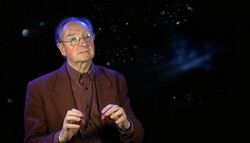David Maloney: Difference between revisions
m (making sure all imdb refs have a preceding asterisk; pass one) |
m (removing real world template. will replace on top of page to avoid collisions) |
||
| Line 1: | Line 1: | ||
[[File:David Maloney.jpg|right|thumb|250px|David Maloney, as he appeared in [[DOC]]: ''[[The Rumble in the Jungle]]''.]] | [[File:David Maloney.jpg|right|thumb|250px|David Maloney, as he appeared in [[DOC]]: ''[[The Rumble in the Jungle]]''.]] | ||
'''David Maloney''' first worked for ''[[Doctor Who]]'' as a [[production assistant]] during [[season 2]]. By the late [[Patrick Troughton|Troughton]] era, he had taken the BBC's directorial course, and was entrusted with the plurality of the episodes in [[season 6]]. Because he helmed ''[[The War Games]]'', he was one of of an elite number of directors to offer his own representation of [[regeneration|the regenerative process]]. He then took a break from ''Doctor Who'', but returned for a significant stretch of episodes during the late [[Jon Pertwee|Pertwee]] and early [[Tom Baker|Baker]] eras. Because he directed the generally-highly-regarded [[serial]]s of ''The War Games'', ''[[Genesis of the Daleks]]'', ''[[The Deadly Assassin]]'', and ''[[The Talons of Weng-Chiang]]'', few directors of the [[1963]] version of ''Doctor Who'' would be as well-remembered as Maloney. | '''David Maloney''' first worked for ''[[Doctor Who]]'' as a [[production assistant]] during [[season 2]]. By the late [[Patrick Troughton|Troughton]] era, he had taken the BBC's directorial course, and was entrusted with the plurality of the episodes in [[season 6]]. Because he helmed ''[[The War Games]]'', he was one of of an elite number of directors to offer his own representation of [[regeneration|the regenerative process]]. He then took a break from ''Doctor Who'', but returned for a significant stretch of episodes during the late [[Jon Pertwee|Pertwee]] and early [[Tom Baker|Baker]] eras. Because he directed the generally-highly-regarded [[serial]]s of ''The War Games'', ''[[Genesis of the Daleks]]'', ''[[The Deadly Assassin]]'', and ''[[The Talons of Weng-Chiang]]'', few directors of the [[1963]] version of ''Doctor Who'' would be as well-remembered as Maloney. | ||
Revision as of 11:15, 17 July 2011
David Maloney first worked for Doctor Who as a production assistant during season 2. By the late Troughton era, he had taken the BBC's directorial course, and was entrusted with the plurality of the episodes in season 6. Because he helmed The War Games, he was one of of an elite number of directors to offer his own representation of the regenerative process. He then took a break from Doctor Who, but returned for a significant stretch of episodes during the late Pertwee and early Baker eras. Because he directed the generally-highly-regarded serials of The War Games, Genesis of the Daleks, The Deadly Assassin, and The Talons of Weng-Chiang, few directors of the 1963 version of Doctor Who would be as well-remembered as Maloney.
Contemporaneously, however, Maloney was at the center of allegations that the show had become too violent during Philip Hinchcliffe's tenure. Some of these rebukes were fairly levelled at him personally. He rewrote the opening to Genesis of the Daleks into a more violent version which displeased both writer Terry Nation and morals activist Mary Whitehouse. (DCOM: Genesis of the Daleks) His direction of The Deadly Assassin famously featured a drowning scene that was so criticized by Whitehouse that it had to be edited from the videotape master. (DCOM, INFO: The Deadly Assassin)
In 1977, Maloney appeared in "Whose Doctor Who," an installment of The Lively Arts news programme which addressed the criticisms leveled by Whitehouse and others about the show allegedly being too intense for younger viewers. AFter his time on Doctor Who, he became a producer, overseeing the first three seasons of another popular BBC science-fiction series, Blake's 7, during the late 1970s and early 80s. He also produced the BBC's famous 1981 adaptation of John Wyndham's novel Day of the Triffids.
As production assistant
As director
- The Mind Robber
- The Krotons
- The War Games
- Frontier in Space (minor: reshot ending to part six as a consequence of directing next serial)
- Planet of the Daleks
- Genesis of the Daleks
- Planet of Evil
- The Deadly Assassin
- The Talons of Weng-Chiang
Interviews and commentaries
- Adventures in Space and Time
- Carnival of Monsters
- The Doctors: 30 Years of Time Travel and Beyond
- The Lively Arts: "Whose Doctor Who"
- DCOM: Genesis of the Daleks

